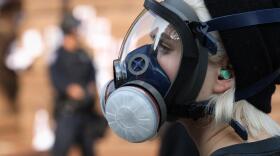A proposed law, drafted and backed by Rochester’s state legislature delegation, would create a system allowing mental health professionals to respond to mental health and substance abuse crises and limit when police can take people experiencing those crises into custody.State Sen. Samra Brouk and Assemblymember Harry Bronson announced Thursday that they would introduce “Daniel’s Law,” named after Daniel Prude, in their respective chambers. If passed, the law would establish a 36-member statewide mental health response council that would ultimately oversee crisis response teams across the state.
The council would be tasked with drafting policies that emphasize a “public-health based response” to mental health crises, that minimize how often police take people experiencing mental health crises into custody, and that promote the use of de-escalation procedures in crisis situations.
The state council would preside over a series of regional councils, which would put those policies and procedures into practice on a local level.
“Mr. Prude’s death further shook the trust of our community that was still reeling from the deaths of George Floyd, Breonna Taylor, and countless other Black and brown people across this country at the hands of police,” Bronson said during a news conference Thursday morning. “Time and time again, we’ve seen the police response to mental health emergencies escalate the situation.”
When police encountered Daniel Prude around 3 a.m. March 23 on Jefferson Avenue he was naked and clearly in distress. His brother, Joe Prude, had called 911 shortly before then to report that Daniel, had earlier been released from psychiatric observation at a hospital, had suddenly left the house.
After officers came across Prude they handcuffed him and ordered him to lie on the street. Prude eventually grew agitated and three officers restrained him using a technique known as segmentation, in which they one officer held down his legs, another held down his head and the third placed a knee across his back.
Prude eventually went unconscious and stopped breathing. He was transported to Strong Memorial Hospital, where on March 30 he died. His death and the circumstances behind it weren’t made public until activists and attorneys for his family released police body camera footage of the incident on Sept. 2.
“What happened to my family was a tragedy, and I pray that it doesn’t happen to anyone else,” Joe Prude said. “Mental illness is not a crime, and it shouldn’t be treated that way.”
Along with establishing the state and regional councils, Daniel’s Law would set guidelines for how police should deal with people in crisis. Police would only be allowed to take people into custody if they were acting in a way that was likely to cause serious harm to themselves or others, the police had been requested to by the mental health response unit, if no regional mental health response council has been established, or if a responding crisis team is incapacitated.
Under the proposed law, police would be able to detain a person if all other attempts by a crisis response unit to offer help have been refused.
“By this point, we’ve heard personal stories, we’ve read the data, and it’s crystal clear that the crisis response system that exists today is not effective,” Brouk said during the news conference. “In some cases, it can even be deadly.”
Daniel’s Law had been a key demand of organizers with Free the People Roc, which organized protests in response to the news of Prude’s death. Ashley Gantt, an organizer with the group, said the law is a long overdue step in the right direction.
“For too long, we have accepted police response as the only response,” Gantt said. “The community has seen, heard, and experienced police misconduct, and our complaints and grievances have been downplayed as we’re told time and time again that these officers were going by the book. Well, it’s time to change the book.”
Rochester is in the midst of introducing new mental response approaches. In January, the city launched the Person in Crisis (PIC) Team, a group of 14 social workers tasked with responding either separately or in coordination with RPD.
When asked how many specialists it would take to address the issue at hand in the Rochester region, Bronson responded frankly.
“I’m not prepared to give a direct number,” Bronson said. “We know we need a hell of a lot more.”





